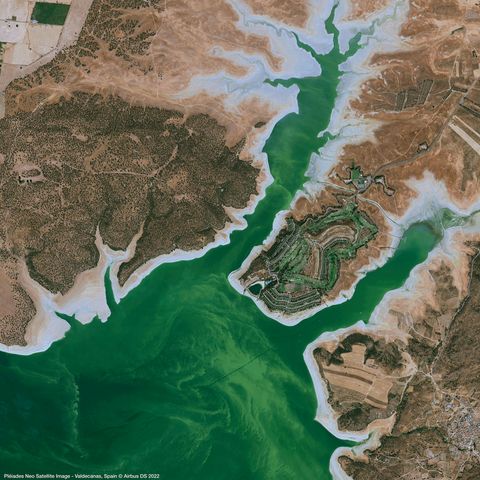Watering hope for tomorrow

The United Nations’ Sustainable Development Goal (SDG) 6 aims to provide safe drinking water and adequate sanitation for all. To help meet this goal, in addition to reducing water use on its sites, Airbus participates in projects to build water infrastructure and secure clean water access and improved sanitation in underserved communities.
Access to water and sanitation are recognised by the United Nations (UN) as human rights – fundamental to everyone's health, dignity and prosperity. Yet, according to UN data, 2.2 billion people still live without access to drinking water, and approximately half of the world’s population is experiencing severe water scarcity. Through a collective approach to creating social impact which brings together our products, community partnerships and employee skill sets, Airbus contributes to solutions that create long-term positive impact for local communities.
Providing access to technology to build capacity and aid decision making
Up in space, the Pleiades satellite constellation is an asset in the effort to provide access to clean water, thanks to collaboration with the non-profit organisation Aquaya. This NGO is dedicated to advancing global health through universal access to WASH (water, sanitation and hygiene). The satellite imagery from Pleiades allowed the project’s digital mapping partners to create fine-scale maps identifying low-income residential areas in Kenya that often lack services such as access to WASH facilities and other necessities. Better understanding these areas through the satellites’ detailed imagery allows for governments and other stakeholders such as Aquaya, to make more informed decisions to ensure vulnerable populations are included in development projects, service delivery, and emergency response. Artificial Intelligence, or AI, also plays a role in efficiently extracting data from the satellite dataset, meaning Aquaya will be able to update maps more quickly and local organisations can more easily identify areas that could benefit from assistance, rather than using manual mapping methods.


Fostering community partnerships
Since 2022, Airbus has been partnering with the Manila Water Foundation (MWF) in the Philippines to support infrastructure development in two remote communities and deliver projects on WASH. Through the first wave of partnership, five multi-faucet hand hygiene facilities were installed in public schools and health centres, serving up to 12,000 community members. While monitoring of the first installations will continue for the next couple of years, the partnership with MWF was renewed in December 2023 aiming to deliver WASH solutions for more families by installing an integrated water supply system in an additional community. This will include the development of the water source with a treatment facility, the laying of a water pipe network and the construction of watering points. The current targeted location is in the Pampanga municipality, serving an Aeta cultural community, aiming to provide improved water access for 187 families, as well as equipping the local school with water faucets. An in-depth community consultation and assessment will be carried out before the final installation location is confirmed. Raising awareness on hygiene through education sessions and upskilling is also an integral part of the project to ensure community adoption and long-term maintenance of the water facilities.

A partnership with the Kenya Red Cross Society, initially established by the Airbus Foundation in 2019, continues with Airbus this year with a focus on upgrading the existing water units with technology improvements, and continuing community outreach around hygiene practices across the 7 public schools in Mukuru Informal settlements of Nairobi, Kenya.
Positive impact through design (DfG)
In 2023, Airbus’ commercial aircraft business joined the global non-profit alliance Design for Good (DfG). DfG brings together efforts and expertise from the corporate, not-for-profit and academic spheres to design and implement products and services to make a direct and measurable impact in progress toward the achievement of the UN Sustainable Development Goals. For the current design cycle, DfG is focusing on SDG6, which addresses clean water and sanitation. Twenty three Airbus designers are currently undergoing the first step of the DfG process: specialist training and masterclasses at the UK Royal College of Art with modules on topics such as mission-led innovation, and life-centred design. Equipped with this new insight and skills, the designers are now being assigned to projects to develop needs-based solutions for issues identified by non-profit organisations. They will then be grouped into teams with members from other companies to develop solutions with a shared goal of improving lives through human and planet-centred designs. The alliance will support the delivery of the solution to communities, and a selection will be scaled for wider implementation.



